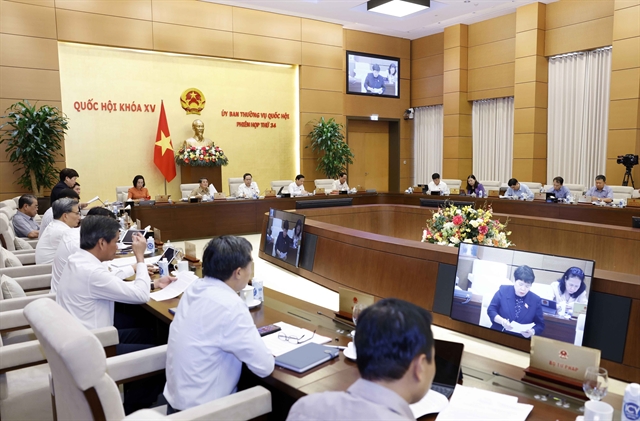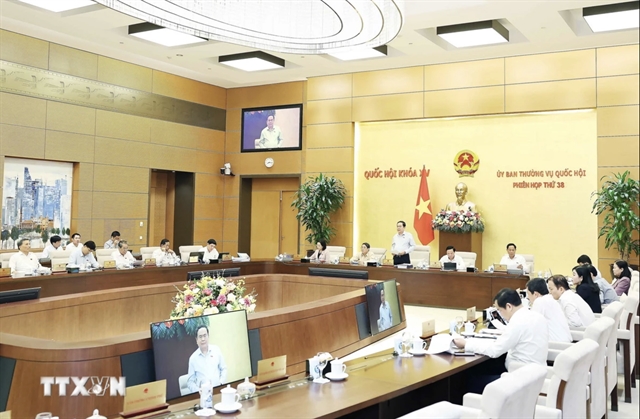 Politics & Law
Politics & Law

 |
| The 38th session of the National Assembly Standing Committee on October 7 in Hà Nội. — VNA/VNS Photo |
HÀ NỘI — The NASC on Monday opened its 38th five-day session reviewing and providing opinions on 21 key items, including eight law projects and two draft resolutions that will be submitted to the National Assembly (NA).
In Monday's morning session, the NASC provided opinions on the draft Law on Management and Investment of State Capital in Enterprises, which addresses State-owned firms' investment activities.
Presenting the government’s proposal, Deputy Minister of Finance Cao Anh Tuấn said Article 25 stipulates that investment projects must receive approval for investment policies from relevant authorities as prescribed by the Law on Investment or the Law on Public Investment.
This process must follow the procedures, order and authority outlined in the relevant investment or public investment laws.
Investment projects of companies that do not fall under the provisions of the investment law or public investment law are to have their investment policies approved according to this draft law.
After the investment policy is approved by authorities, enterprises will implement the investment project according to the regulations of the investment law, construction law and other related laws.
In his review of the proposal, Chairman of the Finance and Budget Committee Lê Quang Mạnh commented that the draft law still contains many new policies that require thorough impact assessments.
To cover all cases involving State capital investment that align with the scope of management and investment of State capital in enterprises and the strict management of State resources to avoid wastage and loss, further research to specify appropriate subjects for application is necessary, Mạnh said.
Mạnh also mentioned that most opinions from the NASC found that the principles for managing the investment activities of enterprises in the draft law do not fully align with the spirit of decentralisation and empowerment for companies.
The draft law still involves administrative interventions in companies' management tasks.
Some of the provisions regarding investment activities of enterprises in the draft law also do not align with related regulations, such as the Law on Investment and the Law on Enterprises.
The reviewing body has therefore recommended revising the regulations to avoid overlaps.
Several members of the committee said they agree with the reviewing body, adding that there are many new policies that have not yet been thoroughly evaluated.
Many aspects still need further refinement, especially in terms of streamlining procedures and reducing reliance on permission-based processes.
Chairman of the Economic Committee Vũ Hồng Thanh emphasised the spirit of Resolution No. 12-NQ/TW, which is to separate State management from corporate governance. He asked: "Why are State-owned enterprises prohibited from leasing their unused office space out? Leaving it vacant, deteriorating and wasting resources is not ideal."
Meanwhile, NA Deputy Chairman Nguyễn Khắc Định also remarked that some aspects of the draft law have not yet fully or consistently reflected the principles of Resolution 12, which notes that the State should manage but not intervene in business operation.
“If there is no decentralisation and delegation, and everything has to be presented to a higher level, how can one take full responsibility?” Định asked, warning that this does not reduce procedures and may cause enterprises to miss opportunities.
NA Chairman Trần Thanh Mẫn said that the principle of enhancing decentralisation and delegation was not clearly reflected in the draft. Moreover, the roles of State capital management agencies and supervisory ministries were not clearly defined. “If one side thinks the other is managing, and the other side thinks the opposite, it ends up leaving a gap,” Mẫn remarked.
Amendments on supervisory activities
During Monday's meeting, the NASC also provided opinions on amending and supplementing some articles of the Law on Supervisory Activities of the National Assembly and People's Councils.
Presenting the review report on the draft law, the Chairman of the National Assembly's Law Committee Hoàng Thanh Tùng emphasised that the Law Committee agrees with the necessity of amending and supplementing some provisions of the Law on Supervisory Activities of the National Assembly and People's Councils.
The reviewing agency also recommended adding and emphasising the principle that the law should only include or codify content under the National Assembly's jurisdiction and must be truly necessary, relevant and consistent with the current structure of the law; it should not incorporate or codify matters, processes or procedures that fall under the authority of the NASC.
For aspects that require flexibility to suit practical requirements, the committee suggested that the NASC be empowered to regulate them.
New policies should only be included in the law after a thorough impact assessment demonstrates their effectiveness and appropriateness.
Speaking at the session, Mẫn emphasised that oversight must be accurate, targeted and focused on key issues raised by the Party, voters and the public.
According to the NA Chairman, every year, the NA, the NASC, the NA Council for Ethnic Affairs and other committees conduct thematic supervision.
People's councils at all levels and local NA delegations also supervise the implementation of National Assembly resolutions, as well as the implementation of the Party's directives, policies and laws of the State.
The NA Chairman also noted that the most important aspect is post-supervision: when a supervisory delegation makes recommendations, there must be specific timelines for implementation.
He requested a review of the draft law's alignment with the Party's directives, policies and State laws.
The supervision activities of the National Assembly and People's Councils should not overlap with the inspection and supervision activities of other agencies. — VNS




